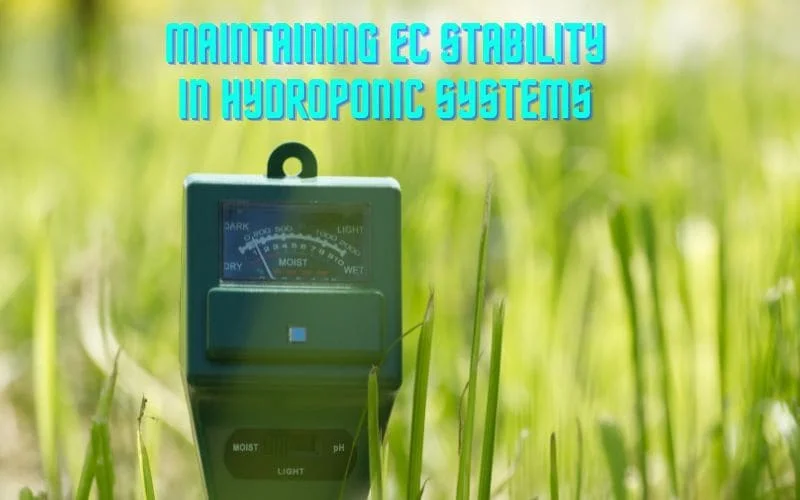Maintaining EC Stability in Hydroponic Systems: 3-Step Guide

Introduction
Welcome to the world of hydroponics, where plants thrive in a soilless environment. Maintaining EC stability in hydroponic systems is essential for ensuring optimal plant growth and vitality. In this guide, we will delve into the key aspects of maintaining EC stability in hydroponic systems and how it contributes to the overall health of your plants. Let’s embark on a journey to discover the secrets of nurturing thriving plants in a water-based world!
1. Optimal Nutrient Levels
Balancing Nutrient Levels
One of the fundamental aspects of maintaining EC stability in hydroponic systems is achieving a balance in nutrient levels. Nutrients such as nitrogen, potassium, and calcium play a crucial role in plant development. By understanding the specific nutrient requirements of your plants, you can ensure that they receive the essential elements needed for healthy growth.
Monitoring and Adjusting EC Levels
Monitoring and adjusting electrical conductivity (EC) levels is crucial to the success of a hydroponic system. Understanding and controlling EC levels directly impact the nutrient balance and overall health of the plants. Here’s a detailed overview of the key aspects of monitoring and adjusting EC levels:
- Importance of EC Monitoring: Regular monitoring of EC levels is essential to ensure that the nutrient solution’s concentration remains within the optimal range. This helps in providing the plants with a consistent and balanced supply of essential nutrients.
- Effects of EC Imbalance: Fluctuations in EC levels can negatively affect the plants, leading to deficiencies or toxicities. By closely monitoring and adjusting EC, growers can prevent these issues and promote healthier plant growth.
- Using EC Meters: Utilizing accurate EC meters is vital for precise monitoring. These meters provide real-time measurements, allowing growers to make immediate adjustments when necessary. It’s important to calibrate and maintain these meters regularly to ensure accuracy.
- Adjusting Nutrient Solutions: When EC levels deviate from the desired range, adjustments to the nutrient solution can be made to restore the balance. This may involve diluting the solution with water or adding nutrients, depending on whether the levels are too high or too low.
- Frequency of Monitoring: Monitoring EC levels should be a consistent practice throughout the plant growth cycle. Different stages of plant development may require varying nutrient concentrations, making regular monitoring essential for optimal growth and health.
2. pH Monitoring and Control
Importance of pH Levels
The pH levels of the nutrient solution play a critical role in the overall health of plants in a hydroponic system. Maintaining the appropriate pH range ensures that nutrients are readily available to the plants. Understanding the importance of pH levels and their impact on nutrient uptake is vital for sustaining healthy and vibrant plant growth.
Regular Monitoring and Adjustment
Regular Monitoring and Adjustment of pH Levels
- Importance of Maintaining pH Levels
- Factors Affecting pH in Hydroponic Systems
- Methods for Monitoring pH Levels
- Benefits of Regular Adjustment
Regular monitoring and adjustment of pH levels are essential for maintaining a stable growing environment in hydroponic systems. pH levels play a crucial role in nutrient uptake and plant health. Here are some key points to consider:
- Importance of Maintaining pH Levels: pH directly impacts the availability of nutrients for plants. Deviations from the optimal pH range can lead to nutrient deficiencies or toxicities, affecting plant growth and overall health.
- Factors Affecting pH in Hydroponic Systems: Various factors, such as nutrient solutions, water sources, and root exudates, can influence pH levels. Understanding these factors is essential for effective pH management.
- Methods for Monitoring pH Levels: pH can be monitored using digital pH meters, test kits, and pH indicators. Regular monitoring helps in identifying fluctuations and taking timely corrective actions.
- Benefits of Regular Adjustment: By consistently adjusting pH levels, growers can optimize nutrient availability, promote efficient nutrient uptake, and maintain an ideal growing environment for plants.
3. Water Quality Management
Managing Water Quality
Water quality management is integral to the success of hydroponic systems. Ensuring that the water used in the system is free from contaminants and possesses the right mineral composition is vital for promoting healthy plant growth. Remember, the water serves as the lifeblood of your hydroponic setup, so maintaining its quality is paramount.
Purification and Contaminant Control
Purification and contaminant control are essential components of water quality management in hydroponic systems. Implementing effective purification methods and stringent contaminant control measures ensures that the water remains pure and suitable for supporting robust plant growth. By focusing on water quality, you can create an environment that nurtures thriving and resilient plants.
Conclusion
As we conclude our exploration of maintaining EC stability in hydroponic systems, it is evident that meticulous attention to nutrient levels, pH monitoring, and water quality management is essential for fostering healthy plant growth. By integrating these crucial practices into your hydroponic cultivation, you can create an environment that supports the flourishing of vibrant and robust plants. Embrace the principles of EC stability and witness the bountiful growth of your hydroponic garden!
